
HOME � REVIEWS � CONTACT � LINKS � ARCHIVES � FORUMS
 |
| HOME � REVIEWS � CONTACT � LINKS � ARCHIVES � FORUMS |

|
Since the early 1980s, Gerard Cosloy has run or co-owned some of the most important US-based independent record labels�notably, Homestead and Matador. Homestead and Matador�s rosters are legendary, and Cosloy�s spoken at length with Damian Abraham about the labels� early days in two excellent podcasts (here and here). The following interview doesn�t focus on the long-defunct Homestead or the very-much-alive Matador. Instead, it revolves around Cosloy�s 12XU imprint�a label running on a much smaller budget, but nevertheless putting out some incredible releases. Like the label�s contemporaries�In the Red, Goner and Goodbye Boozy�12XU�s catholic tastes continue to impress, from David Kilgour solo records to double album collections by the Gary Wrong Group. 12XU�s commitment to vibrant, underground music is exemplary; its model should be duplicated by as many people as possible. TB: 2001 was an inauspicious year to start 12XU. The days of a band like the Raincoats getting releases on Geffen Records appeared to be over. Meanwhile, the record industry was trying to figure out its future business model after the rise of the internet and filesharing. Gerard: Absolutely. There was that sort of weird, golden age where everybody was living off the various permutations of Kurt Cobain leftovers. I guess you can make the argument that Matador was living off of a lot of the leftovers from that period too. The goal with 12XU wasn�t necessarily to establish a new business that would be a �competitive label� or another version of Matador or Homestead. It was meant to be a smaller, leaner and meaner thing from the word go. As much as I like to say Matador had nothing to do with the formation of 12XU, it did have a little bit to do with label�s formation. There were a number of projects I was keen to work on that for a variety of reasons were not going to work out on Matador. My partners (at Matador) were either not interested musically or they didn�t think these acts had potential. There were also conflicts of interests�some of 12XU�s early artists were former Matador recording artists or in one prominent case somebody I was married to. The big impetus for me to start 12XU was a singer-songwriter from Montana, then Seattle and now currently based in Vancouver�a guy named Joel Phelps. He�s probably best known to a lot of people as the former singer and guitarist for Silkworm. But Joel has made a lot more records on his own since leaving the band. Ironically, he left Silkworm right when they signed to Matador. I think the guy is an amazing writer, an incredible musician and an interesting character. I very much wanted to work with him. Although Joel had a number of small labels in the US handling his records, he had no European distribution or representation. Helping him out with that felt like it would be a fun thing to do. Spoon, who I think are rather well known to a lot of people by this point, were between labels at the time. They had been dropped by Elektra Records. TB: Were they still getting extricated from Elektra when you released Girls Can Tell (2001) in Europe? Gerard: They were completely off Elektra. They were very much free agents. Spoon made a third album that I thought was really amazing. There were a lot of weird feelings surrounding the end of their tenure on Matador, both on the band�s side and on the label�s side. They were about to do a deal with Merge in the US. Merge is a fantastic and very well-run label. But at that point they did not have any particular setup for Europe. So I said, �Okay, I�ll do it. Let�s work together again and I�ll handle Europe.� The next two artists that followed, again, had their own family connections. I had been following Chris Brokaw since he was an undergrad at Oberlin University playing in a quartet called Pay the Man. Chris is probably best known as the guitarist and songwriter for the band Come who Matador had worked with for a long time. My ex-wife Sally Crewe, who�s originally from Leeds, England, and then moved all around before living in Austin, she had made a lot of recordings on her own and then cut some stuff with Spoon that was pretty hot. For a variety of reasons that material wasn�t going to come out on another record label so it became another fun thing to embrace. After that I did a record with Speaking Canaries. That�s with Damon Che, formerly of Don Caballero. There�s another vague connection there. Speaking Canaries had previously been on Scat Records. Scat had a distribution deal with Matador for a while. The early days of 12XU, the years 2001 to 2002, there were a lot of connections to Matador�s history and my own history going back quite a ways. |
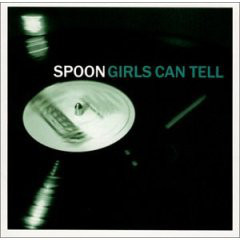
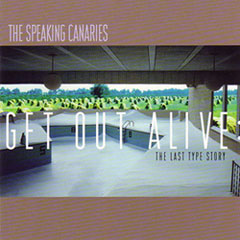
|
TB: I knew you were living in England in the early 2000s, handling work for Matador. But I didn�t realize your ex-wife was British. Gerard: Yeah, she is British. But we met in New York. TB: In the early days of 12XU you were still releasing CDs. This was back when labels were putting out vinyl records on small runs, if at all. Those Spoon LPs have sold for good money. Gerard: There were certainly some records that I did vinyl and CD on. However, there were a number that I released on CD only. That�s very different from now. These days, I very rarely do CDs. I�m not sure that I will again. Merge did repress Girls Can Tell on vinyl. That album was well received. The two Spoon records 12XU released are still the label�s best sellers. TB: In 2004, you left England and moved to Austin, Texas. What prompted you to move there? Gerard: I had moved to Austin for a number of reasons. I had already lived in New York for a long time. I really liked Austin a lot as a visitor. There was a lot going on here musically. I liked the shows here; I liked buying records here. It�s a cheaper place to live than New York or Los Angeles. Austin has a great proximity to the rest of the country. I liked that you were a few hours away from the rest of the cities in Texas and only a two-hour flight from Chicago. Living in the center of the country had a lot of appeal to me. Like a lot of other people who came here for music festivals and trade fairs, I really liked the place. I ended up spending so much time here I just thought, �Why don�t I move here?� Instead of visiting once a month or creating excuses to visit, I just decided to stay. TB: Between 2004 and 2011, 12XU was on hold. Throughout that time, the record industry was in a constant state of flux. What was that period like? Gerard: It�s hard to sum that up quickly, because a lot of what happened during that period seemed like a blur. There were seismic changes in the way music was bought and sold and in the ways people discovered music. We�re still adjusting to those changes now. I don�t think those changes were necessarily good. I mean, if we had to we could talk about the pluses, but for the most part�especially for people making music on the margins�I don�t think the changes were positive. There were certainly big shifts with what was and wasn�t in vogue. Of course, that aspect of music is always changing. TB: I can�t help but notice that journalism, especially print journalism, was in freefall collapse during that period. Gerard: Yeah. But ironically what replaced print media�the journalism that was coming out in 2007 and 2008�I�d take that in a heartbeat over what we have now. The stuff I used to complain about��This Pitchfork reviewer is really annoying��I�d welcome some of those reviewers back with open arms. Compared to what�s going on now, that was a lot better. Now we�re in this one-hundred-forty character, TMZ, here�s-a-link-to-the-SoundCloud, cut-and-paste style of journalism. Obviously, you can find long-form writing and analysis. People are writing about cool stuff. But you have to look further than you ever did before for it. To say that that stuff is out of step with rest of journalism and the rest of pop culture�that�s always been the case. But the dichotomy is pretty severe right now. |
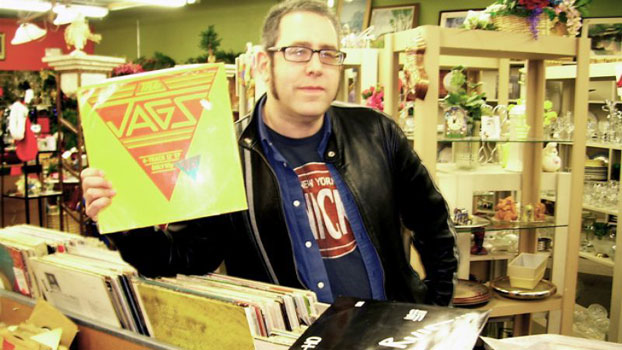
|
TB: It�s not uncommon for record reviews to be simple rewrites of a PR company�s one-sheet. At this point, PR outfits seem to act as gatekeepers for a lot of what gets covered. Gerard: That was a real shift. Obviously, PR has always existed and there were people willing to buy whatever a company�s line was. That�s not a new phenomenon. But what is new�even with what�s left of your so-called alternative media�is that there�s no skepticism anymore about the process. It�s expected that you cooperate with the PR people. I always had this fantasy that if you were publishing a really good music magazine, that you�d want your autonomy from the record business. You�d cooperate with them to an extent for access, but you wouldn�t let that change the tone of your criticism. You wouldn�t simply exist to regurgitate what they fed you. The other thing is that there doesn�t seem to be any skepticism about that fact that it�s a closed shop. Not everyone has access to PR. They might not have the money or the right connections. That has nothing to do with how good your band is. That has nothing to do with whether or not you�re making mind-blowing music. TB: A couple of friends have started their own labels and pumped a disproportionate amount of their funds into PR campaigns. It got them a few more reviews, but it was impossible for them to recoup their expenses. Most didn�t make it to their third or fourth release. Gerard: Different things work for different projects. For instance, I can�t sit here and tell you that Matador doesn�t use PR. We have a highly paid, inhouse director of PR. Occasionally, we have used outside companies when we were overworked. So, I can�t say to you that I don�t see any value in it at all. TB: I�ve viewed them as a necessary evil once you get to a certain level. Gerard: Perhaps. But PR has to be working in concert with other things. In other words, one magazine feature or prominent good review in a vacuum, without stuff happening around it in retail, radio, social media and the streaming world; the band being on tour at the time�that review might only help you sell a few records. You might not sell a single record off a good review. Having the foundation in place and having a band identity, as well as momentum, is much more important than brining in a PR person. Maybe bring a PR person in then. I don�t know. I�m just saying, often people think having a PR person is the answer. Either they�re getting ahead of themselves or it�s an inefficient use of funds. TB: That�s right. And it�s often the case. Gerard: If you�re looking at working with a PR company, I think a good question to ask them would be, �How many projects have you turned down?� If the answer is none, that might tell you a lot about them. TB: You had that horrendous housefire back in 2009. Gerard: Right. TB: I recall asking you if you had any old issues of Conflict and you mentioned that you�d lost everything. Gerard: Everything was lost. I got out of there with a pair of pants. I had one guitar at someone else�s house and a guitar at a rehearsal space in North Austin. My car survived the fire. That was about it. It was horrible. It was very nice to be alive. It was great that no other people or cats or dogs were injured in the fire. I had safety nets. I had a job and a salary; family and friends to stay with and insurance. It was an awful experience, but people have gone through way worse. |
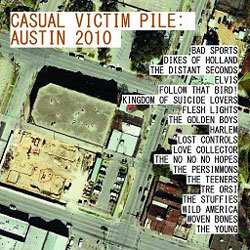
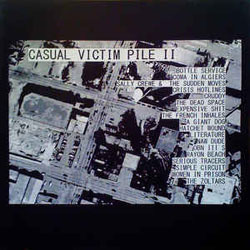
|
TB: What was the impetus to start 12XU again in 2011? Gerard: I had wound the label down around 2006 or so. The numbers were pretty poor and a lot the bands had moved on to other things. Running a UK/European-based label from Austin clearly wasn�t going to work. I did a comp on Matador called Casual Victim Pile in 2010. It was all Austin bands. It was not meant to be a comp that said, �This is the Austin scene.� It was a very biased selection. It was me saying, �Here�s a particular generation of bands, playing a particular type of music. I like them and I hope you do too.� It was a very affordable introduction to a lot of groups. That was all it was meant to be. I know the record was not very well received. Fans of the bands on the comp liked it a little bit. A few of the groups joked around about it: �Hey, we�ve got a record on Matador!� The album did not get good reviews. It did not sell very well. It created a little bit of acrimony from some local bands who did not get on it. TB: That�s sort of like The Decline of Western Civilization. A few bands were filmed for it that didn�t make the cut. They weren�t happy about it. Gerard: Yeah. There were these sort of pop, career-orientated bands�the 101X and KUTX groups�who were wondering, �Why do these shitty local bands get to be on a Matador comp? We have a PR person and a manager. Why weren�t we on the comp?� Honestly, it didn�t really concern me much. Although Casual Victim Pile was not well received, I decided fairly quickly to do another volume (Casual Victim Pile II, 2011). By the time the first record had come out another ten of fifteen really great Austin bands had formed. Some of them did not have a way of getting their music out. Half the bands from the first comp had already broken up and formed new groups. OBN III�s and A Giant Dog had started up. James Arthur had moved back to Austin. All of this stuff was going on�The Zoltars had gotten going. It�s like, �Oh, shit! I�d better do another one.� I think the second volume was better than the first one. I couldn�t in good conscience involve Matador a second time. The first one was such a commercial bomb. It wasn�t a massive drain on company resources, but it wasn�t fair to make everyone there stop what they were doing to put effort behind a record that was very much one person�s folly. 12XU�s infrastructure still existed. I had the same PO Box; the website was still up. �Why not just start it up all over again?� As much as I bristle at Matador always being dragged into the conversation, I can�t deny that there�s a connection there. Casual Victim Pile II rebooted 12XU. And then it�s like, �Cruddy is the best band in town. They�re so great, night after night. They should have an album out and, hey, 12XU already exists.� After the Cruddy record (Negative World), people started asking me, �Hey, can we do a record?� There was no grand plan back in 2011 to turn 12XU into an eight-or-nine-record-per-year operation. It just kind of happened that way.TB: There was a carry over as well from the earlier incarnation of the label. You were still doing records with Chris Brokaw. Gerard: Right. TB: One of the real gems from that period was the David Kilgour and the Heavy Eights� Left By Soft (2011). Gerard: Matador had a history with David. I�ve known the guys in The Clean for years. I was working with The Clean (Compilation, 1988) back in the Homestead years. There are a lot of tangled webs that go way back. Take Bim (Lamont Thomas). I�ve worked with Bim in one capacity or another since the Bassholes. TB:You released Don Howland�s last record (Life is a Nightmare, 2015). That�s a connection going back to the Gibson Bros. Gerard: Back to the mid-�80s. TB: Don had left Great Plains before they joined Homestead, correct? Gerard: Great Plains signed to Homestead right after he left the band. All of my initial dealings with Don were very negative. He was writing for (Tim Anstaett�s) The Offense. Honestly, I can�t even remember what caused the acrimony. Perhaps I started a fight with Don which would�ve been a really stupid move on my part. But in those days, I tended to pick fights with everyone. Often it wasn�t even meant to be hostile. It was about having fun. Not everyone felt the same way about it. I understand that now. When you have a familiarity with someone they can read between the lines, understand the difference between an insult and kidding around. If it�s someone living miles away it can get taken the wrong way. Certainly, communicating in the letters columns of old fanzines wasn�t the greatest way to initiate conversations. |
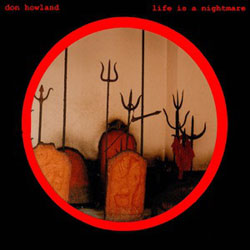
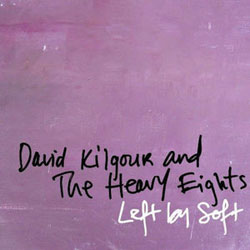
|
TB: How were you first exposed to New Zealand music? When I think of early adopters to Flying Nun and Xpressway I think of Tom Lax. Gerard: I�m not sure who the first person was. Around �87 and �88, I started hearing a lot of the Flying Nun stuff around New York. Patrick Amory, who is now one of my partners at Matador, likely turned me on to a lot of that stuff. Patrick did the Too Fun Too Huge zine back in the �80s. Patrick managed the band Sorry. For a long time, Patrick was the music director at WHRB in Cambridge. Some of Patrick�s predecessors at WHRB, Jim Barber and Geoff Weiss�they may have been some of the earliest guys to start playing those records on the radio. College radio in the Boston area, WMBR and WHRB, were big proponents of Flying Nun. Venus Records in New York started importing Flying Nun records. That was one of the first places I saw The Chills, Verlaines and Clean albums for sale. I remember Venus Records even had a New Zealand bin. Venus was on 8th Street and 6th Avenue. They were getting them before everyone else. Very few people knew about those records then in the United States It was revelatory. I started writing Roger Shepherd after that: �How do we get more of these records?� TB: Matador Direct carried records from a lot of amazing labels including Flying Nun. The roster was really exceptional. Nevertheless, I know that for some labels, like Siltbreeze, the relationship didn�t pan out well. Gerard: Yep. We were buying a lot of really good records from third-party vendors. I wish we were still doing stuff like that. It was a lot of fun. There were things about it that were not sustainable. We were doing manufacturing and distribution for a number of independent labels. That was a disaster for us and it was certainly a disaster for them. The fact that those episodes didn�t put those labels out of business is a testament to how smart and dedicated those people are. TB: Jumping back to 12XU, I realize End of an Ear had put out a Stick Men with Ray Guns album previously. But how did the two live records (1,000 Lives to Die and Property of Jesus Christ) you released in 2016 come about? Gerard: It was all thanks to Uber. I would personally like to thank that guy Travis (Kalanick), the head guy at Uber�whose company condoned sexual harassment of female employees; the same guy who�d harass his employees for asking for health insurance. Travis, you�re responsible for bringing Bobby Soxx�s misanthropic visions back to the world. About two and a half years ago, I called an Uber. I�d now like to apologize for that. Anyhow, this guy comes by and picks me up. He says, �Oh, yeah, we know some of the same people. I�m Jack Control.� And Jack�who sings for the band Butcher and has been in a lot of great bands over the years�he�s an excellent producer and mastering engineer. Jack happens to be my Uber driver. We�re talking. Jack says, �Hey, I have a few Stick Men with Ray Guns live recordings. Would you be interested in hearing them?� I told him, �Oh, yeah. I�d be very interested in hearing them.� So that�s how that happened. Jack got me in touch with the band�s guitarist, Bobby Beeman. We worked out a deal. That wouldn�t have happened without Jack. That was a situation where you totally lucked into something.TB: You�ve been uncomfortable with 12XU being categorized as an Austin label. Gerard: It�s a double-edged sword. On one hand, I do love living in Austin. And I can�t deny that there are a lot of Austin musicians on the label. It would be ridiculous for me to say, �Oh, the label has nothing to do with Austin.� I guess the problem I have with it is twofold. One, I don�t think the rest of the world takes Austin that seriously. So much bad, commercial, mediocre, KUTX-type music comes out of the city that people don�t take it seriously as a source of meaningful music. Two, I think when it comes to underground music�be it punk, hardcore or experimental�people outside of the city think there�s a ceiling on how good it can be because it�s from Austin. They think, �Well, if they�re any good why aren�t they in New York or Los Angeles? Well, when they�re serious they�ll move to Brooklyn.� That enrages me. Obviously, I�m biased. But you can�t tell me that Downtown Boys are a more serious band than The Gospel Truth. They�re not. But the idea that they�re connected, that they have an agent and are based in a different region gives them a running head start�that doesn�t work for me. I mean, there�s probably some resentment on my part. But there�s also a lot of bands on the label who aren�t from Austin. I�ve put out records by artists from Canada, Australia and New Zealand. Having 12XU identified as an Austin label�I�m not a cheerleader for Austin. I�m a friend and champion to the bands I think are good. They�re not good because they�re from Austin. Sometimes they�re good in spite of the fact they�re from Austin. |
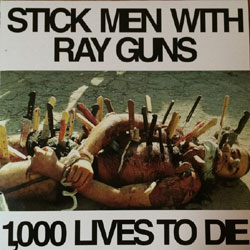
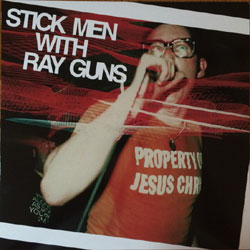
|
TB: At least once, someone locally has asked me to put out their record and I didn�t have the resources to do it. A short time later their album appeared on 12XU. There have always been a few good labels who will pick up records that otherwise would have fallen through the cracks. It was a different business model, but Homestead was like that too. Gerard: It was different world then. In the early days of Homestead, there was the mentality that, �If we don�t put this out, nobody else will.� That surely informed the early creative choices at Matador, and it has informed a lot of the choices at 12XU. If there�s a band that has five labels chasing them, they really don�t need me. I�m probably the worst person they can talk to. TB: Oh, no. I�m a few rungs below you. It gets worse. (laughs) Gerard: Yeah, yeah. (laughs) I want to work with people who I enjoy being around and have a similar vision. If it�s a band that says to me, �Oh, we�re talking with Modern Outsider and Richard Lynn.� My response is, �Well, enjoy your conversations, guys. That has nothing to do with me.� I don�t need lawyers and managers. I put out records by bands I can work with directly. I�m not interested in people who are �auditioning� for labels or are being courted by them. 12XU is not part of that universe and it never will be. Good luck to the people who do that. I hope they�re very successful. That�s not for me. I�m not being disingenuous. It�s not like I�m not trying with 12XU. I�m trying to do something in a different way. TB: It says something about your commitment to the label that while still a co-owner of Matador, you�re regularly at the post office getting 12XU�s mail order out promptly. Gerard: I buy a lot of records. I always appreciate it when people send me stuff promptly. I also like ordering direct from labels so the money goes directly to them. I�m not going to tell you that I enjoy having stacks of boxes at my house. I don�t have any assistants with 12XU. TB: It seems to me that the indefatigable drive that a lot of these smaller labels have has really kept a lot of things moving. How many years has Gabriele Di Gregorio kept Goodbye Boozy going now? It�s pretty incredible considering how difficult it is to simply get records made nowadays. Gerard: Yeah. It can be very discouraging. It�s hard to get records manufactured. It�s hard to get them in stores. When you get paid, the margins are so razor thin. For 7�s there are no margins at all. TB: I wholesale them at cost. Occasionally, it�s been ten cents below cost. Gerard: Yeah. For LPs, the margins are very thin. The only place where there are serious margins is in download sales. And the market for download sales is completely in the toilet thanks to our good friends in the streaming world. Although streaming is the future and everyone loves its convenience, being able to press a button and have all the music in the world at your fingertips�which in reality isn�t all the music in the world�the economics of that is potentially lucrative because there�s no inventory. But until you�re in that hundreds of thousands of plays range the revenues are so pitiful. It doesn�t even cover your costs for getting the music on the service. We�re seeing this thing right now with the big labels pumping out the hits�Sony, Universal and maybe even Matador�that streaming could be a lifeline: �Hey, there�s potential light at the end of this tunnel. We�re going to be okay.� The problem is�what happens to all the small labels and weird bands and record stores that are being supplanted by streaming? What happens to college radio stations whose licenses are sold to Muzak stations? You get rid of all those things�small record stores, small record labels, college radio stations, fanzines, the weekly newspapers�where�s your so-called incubator? Where is your next fantastic artist of the month coming from? I think it�s a fallacy�this notion that, �Hey, it�ll happen on Bandcamp or SoundCloud.� And there are some good bands coming out of that universe. But the notion that, �Oh, just put that song on BandCamp and everything will be fine.� It�s not that simple. Fanzines are dying. There�s one-seventh the amount of record stores in existence currently and their buying habits are much more conservative. It�s much more of an uphill battle. TB: There could also be conceivable issues with archiving. What happens when SoundCloud goes away? Unlike owning a physical format that�s gone into hundreds of hands, there�s a chance a lot of the music on the site will disappear with it. Gerard: Yeah, what happens when SoundCloud goes away? And it will go away. Where will that stuff go? Where�s it backed up? That�s a very good point. The fact that some kid in the Midwest can be sitting in front of his computer, listening to some insane, hip-hop, drone guitar piece that was done in West Africa and recorded on a cellphone�there�s no gatekeeper there. That�s cool. I�m not going to say it�s punk rock. We�re always seeing things through this prism of punk rock and DIY culture. It�s very limiting. The next cool thing to excite us will likely not remind us of 1975 or 1967 or 1991. That�s the way the world works. It�s constantly changing. And we can either change with it or sit around and bitch and moan. But that experience that I�m talking about��I stumbled across this and it�s amazing��that doesn�t happen so often anymore. Now what we�re getting is the PR thing you were talking about. So much of the online content you see, on sites both big and small, the gatekeeper is now the PR person. Spotify is the single most powerful way for people to discover music now. But access to Spotify is limited. Small labels can�t deal with them directly. They need to go through a middleman who takes a cut. Spotify�s playlists�I mean, who needs DJs and rock journalists now that we have playlists. TB: Right. So many radio stations aren�t even manned nowadays. Gerard: Yeah. The thing with these playlists, they�re not being programmed by music fans. Spotify is programming their playlists by meetings they�ve had with labels� marketing departments. It�s just another version of commercial radio. It might even be tighter and more limiting than commercial radio�s programming. But now there won�t be community radio to compete with them. The whole experience of listening to KALX, WHRB or WFMU and having your mind blown, or having a record clerk force you to listen to a record that opens up new doors�that�s not going to happen. It may sound old fashioned, like an older person bemoaning the passing of the manual typewriter. But that stuff was cool because it was human. I get worked up over it because a lot of the best friendships in my life came across in situations where I was surrounded by kooks and creeps in record stores and weirdos with late-night radio programs. By people who put on their own gigs and put out their own records. Of course, men and women of all background. You get rid of all this�music gets controlled by a larger entity than I think people recognize. It�s dangerous. TB: On a more optimistic note, what do you have coming out on 12XU? And before I forget, I want to mention that the recent Gary Wrong double LP collection you released was excellent. Gerard: Oh, thank you. Chad (Booth) is one of the great figures of underground music. I wish he was better recognized and put one of his bands on the road for seven months. He�d just destroy everyone. Whether it was the Gary Wrong Group or Wizzard Sleeve�he�s one of the best. To my mind, he�s a real evil visionary. Whatever he does next will be killer for sure. Next up is a 7� collaboration between Spray Paint and Ben Mackie who is in Cuntz. That should be out in a couple of weeks. The Golden Boys will have a new LP out in October. They recorded it with Stuart Sikes. It�s their first album in five years. Early next year we�ll have a record by Charnel Grounds which is a collaboration between Kid Millions of Oneida, Chris Brokaw and James McNew of Yo La Tengo. There�s a new Unholy Two album that�s getting finished. And a single from Austin band Missing Pages will be out, featuring Steve Svacina formerly of Sweet Talk. |
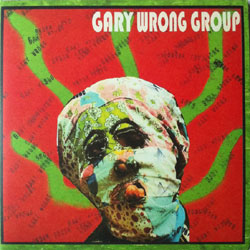
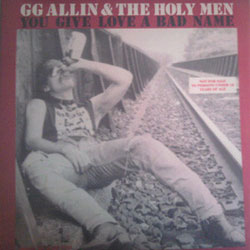
|
TB: I wanted to ask you a couple more questions. Did you ever have any in-depth conversations with GG (Allin)? Gerard: Yes. I think I played three shows with GG. I recorded an album (You Give Love a Band Name, 1987) with him. I spent a substantial amount of time in his company. While fully acknowledging GG�s many faults�he did do a lot of nasty things to people�he was a somewhat complicated person. I don�t want to speak ill of the dead; GG isn�t here to piss all over the lunch I�m eating. GG could be very, very funny, extremely lucid and even reasonable to hang out with. But there were other moments that were a little more unhinged. I think there were two things going on with him. He did a lot of drugs, which obviously affected him. GG also liked attention. There was a certain point where he really liked being egged on. People were going to shows wanting to see him be GG Allin. At that point, it began to lose a lot of appeal to me. TB: That period where GG was going on Geraldo. Gerard: Again, I know this sounds terrible because it appears as though I�m condoning violence against audience members. I�m not. I�m just saying that people who were going to GG�s shows thinking, �Oh, I hear he�s the rock �n� roll wild man. It�s supposed to be the New York Dolls meets blah, blah, blah.� I mean, having a dude in a jock strap stand next to them, and then having him throw shit on them before getting the plug pulled after fifteen minutes�that�s kind of an amazing moment. I don�t want to see anybody get hurt. But there was something very funny about these folks who supposedly were into dangerous rock �n� roll. �I like punk.� And they go to GG�s show and it�s a total disaster. That had some appeal to me. But when it switched to, �Oh, I want to go to the show because GG�s going to throw shit at somebody, or GG�s going to punch somebody in the face. I hope it ends in a riot.� And then when it doesn�t end in a riot, they�re disappointed�that�s when I began to lose interest. At that point, you might as well check out the Rolling Stones at your nearest stadium. The other thing about GG, he wasn�t a phony. He wasn�t Perry Farrell or Marilyn Manson trying to get their shit into Hot Topic. GG owned it. He was a scared and messed up person, and he�d show you it on stage. TB: I remember in Hated it�s mentioned that he showed up to high school in Vermont in the early �70s dressed up in drag. He wasn�t going to the Mercer to play to a bunch of Velvet Underground fans. That was pretty hardcore. Gerard: Anybody at that time doing that in rural America, he was an absolute American original. TB: And I�ll ask for the last time: when�s that Conflict anthology coming out? Gerard: Never. It just wasn�t very good. There was some passable stuff in the last two years of the magazine. But the first few years were really, really bad. There were people who really liked the magazine and that�s flattering. But I don�t think it�s worth an anthology. END INTERVIEW.
12XU website is HERE. To read other TB interviews, go here. |
| PREVIOUS PAGE � HOME � NEXT PAGE |